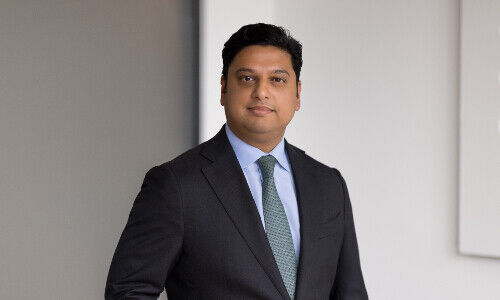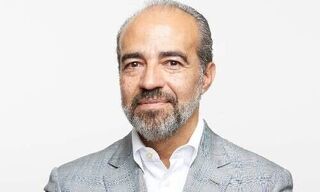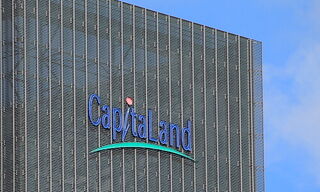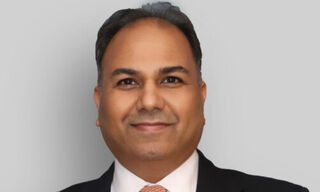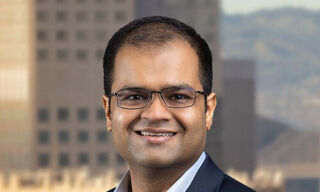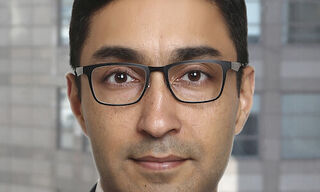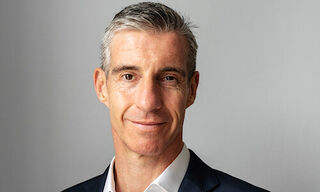Investors are clinging to cash now that it offers a level of income not seen for more than a decade. But in doing so, they're missing out on much better opportunities, Shaniel Ramjee writes in his article on finews.first.
finews.first is a forum for authors to comment on economic and financial topics.
On the eve of the pandemic, investors were chasing every tiny increment of additional yield. Wherever they could find it. As they had done for much of the post-global financial crisis decade.
It meant Austria could issue 100-year bonds. Companies could borrow at historically low rates with only the lightest of protections for lenders. And the landscape was littered with corporate zombies – heavily leveraged companies whose earnings barely covered interest costs, even at near-zero interest rates.
Everything changed with the post-pandemic global surge in inflation. Yet now that investors can earn rich rewards from public asset markets – including double-digit yields in parts of the credit and the emerging universe – they’re steering clear, clinging to cash instead. Globally investors are holding $2.6 trillion more in money markets than they did in 2018.
«Yet there’s still a reluctance to draw down holdings of money market instruments and shift the capital»
True, for the first time in more than a decade, that cash is generating an attractive return – some 5.1 percent in the US and 3.8 percent in the eurozone. Given inflation has fallen back substantially, that’s a significant return in real terms on both sides of the Atlantic.
But with central banks signaling that they’ll be cutting rates, money market returns have already started to fall, and are likely to drop further – the market is pricing in three quarter-point interest rate cuts in the US this year, which would take official rates to 4.75 percent.
Yet there’s still a reluctance to draw down holdings of money market instruments and shift capital into higher-yielding assets. In part, it could be that this excessive caution has to do with investors re-calibrating not only their risk appetites but also levels of market risk.
«Even the highest quality ‹safe haven› US Treasury bonds suffered double-digit losses during that year»
For instance, the spike in inflation reminded investors that «risk-free» sovereign debt was anything but. Aggressive rate hikes by central banks led to historic selloffs in bond markets and bouts of extreme volatility. So in 2022, global bonds lost 31 percent, the biggest loss the fixed-income market had suffered since at least 1900.
Even the highest quality «safe haven» US Treasury bonds suffered double-digit losses during that year. For investors, those will be painful memories that won’t fade quickly.
And the inversion of the yield curve – shorter maturity debt yielding more than long-dated bonds – makes cash look more attractive. Investors just aren’t being rewarded for taking on maturity risk.
Even so, there’s potentially plenty on offer from credit and equities. Investors should be looking at assets that offer ample compensation against risks, and a buffer against volatility. Right now, certain high-yield credit and emerging markets offer significant protection against drawdowns. Short-maturity investments avoid some of the risks of policy volatility. Overall breakeven yields – the level that yields need to rise before investors lose money – are among the highest in a decade. And then there’s equity.
Equity market volatility has dropped even though valuations are relatively high – particularly in some sectors – and the effective duration of these assets is long. Equities weathered the monetary policy tightening cycle better than bonds, to the surprise of many, because companies themselves can respond to changes in conditions.
«What investors need is a margin of safety»
Corporate management can overhaul their business models and change their general approach as the economic environment shifts. It is telling that, even as corporate earnings suffered initially from rising inflation, they’ve made a rapid recovery since.
This resilience and the fact that most leading economies look set to skirt recession this year against a backdrop of falling interest rates should underpin equities and therefore investor returns.
If the past couple of years have shown anything, it’s that risk is impossible to avoid. Even money market instruments were shown to be vulnerable during the Lehman Brothers meltdown that triggered the global financial crisis of 2008. What investors need is a margin of safety, a cushion to keep them afloat through the market’s frequent rip tides.
Across most risk preferences, investors would do better diversifying their portfolios across the markets’ capital structure than sitting on cash, thanks to the margin of safety on offer from current yields and spreads. Not only is cash, not king, it could prove to be the joker in the pack.
Shaniel Ramjee joined Pictet Asset Management in 2014 as a Senior Investment Manager in the Multi-Asset London team. He holds an MSc in Finance from the University of St. Andres and a BA Hons in Economics and International Business from the University of North Carolina at Chapel Hill (US). He is a Chartered Financial Analyst (CFA) charterholder and holds the Investment Management Certificate (IMC).
Previous contributions: Rudi Bogni, Peter Kurer, Rolf Banz, Dieter Ruloff, Werner Vogt, Walter Wittmann, Alfred Mettler, Robert Holzach, Craig Murray, David Zollinger, Arthur Bolliger, Beat Kappeler, Chris Rowe, Stefan Gerlach, Marc Lussy, Nuno Fernandes, Richard Egger, Maurice Pedergnana, Marco Bargel, Steve Hanke, Urs Schoettli, Ursula Finsterwald, Stefan Kreuzkamp, Oliver Bussmann, Michael Benz, Albert Steck, Martin Dahinden, Thomas Fedier, Alfred Mettler, Brigitte Strebel, Mirjam Staub-Bisang, Nicolas Roth, Thorsten Polleit, Kim Iskyan, Stephen Dover, Denise Kenyon-Rouvinez, Christian Dreyer, Kinan Khadam-Al-Jame, Robert Hemmi, Anton Affentranger, Yves Mirabaud, Katharina Bart, Frédéric Papp, Hans-Martin Kraus, Gerard Guerdat, Mario Bassi, Stephen Thariyan, Dan Steinbock, Rino Borini, Bert Flossbach, Michael Hasenstab, Guido Schilling, Werner E. Rutsch, Dorte Bech Vizard, Katharina Bart, Maya Bhandari, Jean Tirole, Hans Jakob Roth, Marco Martinelli, Thomas Sutter, Tom King, Werner Peyer, Thomas Kupfer, Peter Kurer, Arturo Bris, Frederic Papp, James Syme, Dennis Larsen, Bernd Kramer, Armin Jans, Nicolas Roth, Hans Ulrich Jost, Patrick Hunger, Fabrizio Quirighetti, Claire Shaw, Peter Fanconi, Alex Wolf, Dan Steinbock, Patrick Scheurle, Sandro Occhilupo, Will Ballard, Nicholas Yeo, Claude-Alain Margelisch, Jean-François Hirschel, Jens Pongratz, Samuel Gerber, Philipp Weckherlin, Anne Richards, Antoni Trenchev, Benoit Barbereau, Pascal R. Bersier, Shaul Lifshitz, Klaus Breiner, Ana Botín, Martin Gilbert, Jesper Koll, Ingo Rauser, Carlo Capaul, Markus Winkler, Thomas Steinemann, Christina Boeck, Guillaume Compeyron, Miro Zivkovic, Alexander F. Wagner, Eric Heymann, Christoph Sax, Felix Brem, Jochen Moebert, Jacques-Aurélien Marcireau, Ursula Finsterwald, Michel Longhini, Stefan Blum, Zsolt Kohalmi, Nicolas Ramelet, Søren Bjønness, Gilles Prince, Salman Ahmed, Peter van der Welle, Ken Orchard, Christian Gast, Jeffrey Bohn, Juergen Braunstein, Jeff Voegeli, Fiona Frick, Stefan Schneider, Matthias Hunn, Andreas Vetsch, Fabiana Fedeli, Kim Fournais, Carole Millet, Swetha Ramachandran, Thomas Stucki, Neil Shearing, Tom Naratil, Oliver Berger, Robert Sharps, Tobias Mueller, Florian Wicki, Jean Keller, Niels Lan Doky, Johnny El Hachem, Judith Basad, Katharina Bart, Thorsten Polleit, Peter Schmid, Karam Hinduja, Zsolt Kohalmi, Raphaël Surber, Santosh Brivio, Mark Urquhart, Olivier Kessler, Bruno Capone, Peter Hody, Michael Bornhaeusser, Agnieszka Walorska, Thomas Mueller, Ebrahim Attarzadeh, Marcel Hostettler, Hui Zhang, Michael Bornhaeusser, Reto Jauch, Angela Agostini, Guy de Blonay, Tatjana Greil Castro, Jean-Baptiste Berthon, Marc Saint John Webb, Dietrich Goenemeyer, Mobeen Tahir, Didier Saint-Georges, Serge Tabachnik, Vega Ibanez, David Folkerts-Landau, Andreas Ita, Michael Welti, Mihkel Vitsur, Fabrizio Pagani, Roman Balzan, Todd Saligman, Christian Kaelin, Stuart Dunbar, Carina Schaurte, Birte Orth-Freese, Gun Woo, Lamara von Albertini, Ramon Vogt, Andrea Hoffmann, Niccolò Garzelli, Darren Williams, Benjamin Böhner, Mike Judith, Jared Cook, Henk Grootveld, Roman Gaus, Nicolas Faller, Anna Stünzi, Thomas Höhne-Sparborth, Fabrizio Pagani, Guy de Blonay, Jan Boudewijns, Sean Hagerty, Alina Donets, Sébastien Galy, Roman von Ah, Fernando Fernández, Georg von Wyss, Stefan Bannwart, Andreas Britt, Frédéric Leroux, Nick Platjouw, Rolando Grandi, Philipp Kaupke, Gérard Piasko, Brad Slingerlend, Dieter Wermuth, Grégoire Bordier, Thomas Signer, Gianluca Gerosa, Christine Houston, Manuel Romera Robles, Fabian Käslin, Claudia Kraaz, Marco Huwiler, Lukas Zihlmann, Sherif Mamdouh, Harald Preissler, Taimur Hyat, Philipp Cottier, Andreas Herrmann, Camille Vial, Marcus Hüttinger, Serge Beck, Alannah Beer, Stéphane Monier, Ashley Simmons, Lars Jaeger, Shanna Strauss-Frank, Bertrand Binggeli, Marionna Wegenstein, George Muzinich, Jian Shi Cortesi, Razan Nasser, Nicolas Forest, Joerg Ruetschi, Reto Jauch, Bernardo Brunschwiler, Charles-Henry Monchau, Philip Adler, Ha Duong, Teodoro Cocca, Beat Wittmann, Jan Brzezek, Florin Baeriswyl, Nicolas Mousset, Beat Weiss, Pascal Mischler, Andrew Isbester, Konrad Hummler, Jan Beckers, Martin Velten, Katharine Neiss, Claude Baumann, Daniel Roarty, Kubilay Yalcin, Robert Almeida, Karin M. Klossek, Marc Taverner, Charlie T. Munger, Daniel Kobler, Patrick Stauber, Colin Vidal, Anna Rosenber, Judith Wallenstein, Adriano Lucatelli, Daniel Goleman, Val Olson, Brice Prunas, Francesco Magistra, Brigitte Kaps, Frances Weir, Luis Maldonado, Francesco Mandalà, Francesco Magistra, Nadège Lesueur-Pène, Massimo Pedrazzini, Eric Sarasin, David Ellis, Dina Ting, Ralph Ebert, and Christopher Gannatti.

